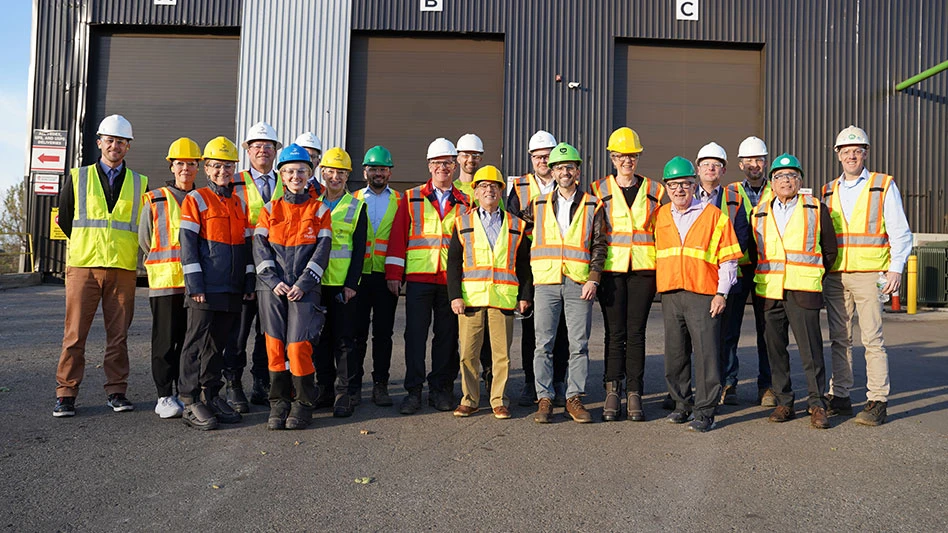
Photo courtesy of Padnos
In the fall of last year, Norway-based aluminum producer Norsk Hydro and Holland, Michigan-based recycling firm Padnos announced the formation of a joint venture, Alusort LLC, designed to industrialize Hydro’s proprietary sorting technology, HySort, bringing this “advanced aluminum sorting technology” to the United States.
HySort uses laser-induced breakdown spectroscopy, or LIBS, technology that was developed with Texas-based Austin AI, and Hydro’s recycling hub in Dormagen, Germany, has been using the technology to recover specific aluminum alloys from obsolete vehicles and electronics.
Through their 50/50 joint venture, the companies have begun the process of installing the HySort technology at Padnos’ existing facility in Grandville, Michigan.
The partnership extends the long-standing relationship between the companies. “We’ve been working with Hydro for years, supplying their various facilities with raw materials,” says Sam Padnos, manager of nonferrous trading at Padnos.
To address the needs of its consuming customers like Hydro, Padnos has been focused on advanced sorting of nonferrous metals. “We’ve reinvested significantly into our Grandville campus, which is really our main downstream campus, and we’ve been working on refining our products [and] improving recoveries,” he says.
Sam Padnos adds that “significant leaps” in technology have been made in the recycling industry recently and are critical to sorting recycled material streams to put recovered materials to the best uses. “The important things to focus on are accuracy and throughput,” he says. “Many technologies are commercially available that might not necessarily hit those two critical key components.” However, he notes the HySort technology offers leading metrics in both of those categories.
The standalone company, Alusort, is an extension of Padnos’ existing downstream processing campus in Grandville. The HySort technology complements Padnos’ nonferrous sorting capabilities, which include several different commercially available technologies and some that are proprietary. “We’ve identified that we can improve our internal development,” Sam Padnos says.
The sorting technology is further enhanced by Padnos’ skilled employees, he says. “We’ve got a great team ranging from operations to engineering to facilities and maintenance.”
Padnos has been focused on separating shredded aluminum by alloy and has evaluated various commercially available technologies. “When we heard about what Hydro was doing with their HySort technology, it seemed like a really good opportunity,” Sam Padnos says.
Both companies bring individual strengths to the partnership, which includes Padnos’ focus on sourcing and processing recycled materials and Hydro’s experience in industrial-scale technology development. “But it’s so much more than that,” he adds. “This partnership is a great fit between our organizations as we’re aligned on so many subjects.” The companies were both founded in 1905 and share a similar ethos that prioritizes safety, philanthropy and resource efficiency.
Alusort startup is expected this summer, but the companies are not rushing anything. “I’d love to say this is going be an end of Q2 startup, which it very well could be, but obviously we want to make sure that we’re walking before we run,” Sam Padnos says, adding that ensuring safety at the new operation also is a primary focus.
While Alusort is a standalone entity, Padnos personnel will run the day-to-day operations, with Hydro personnel providing technical support as well as oversight of the daily activities. Sam Padnos says the company will be able to deploy resources as needed to ensure operational efficiency.
The HySort technology will be integrated into Padnos’ existing operation in the sense that “it’s the natural last step beyond the existing X-ray sorting technology,” he says. The unit will be batch-fed, and Alusort’s goal is to deliver on-spec sorted material to Hydro.
Using HySort, Alusort will be able to narrow in on the key chemical analysis that X-ray technology has been unable to do, Sam Padnos says.
Alusort will target a variety of input streams with the goal of processing at least 40 million pounds annually, purchasing the material it processes from Padnos and other suppliers, potentially, and selling the sorted material to Hydro and other consumers, including secondary aluminum consumers or die casters. “But the intent is to produce on-spec material to support Hydro’s raw material needs for Circal production,” he says.
Regarding the aluminum Alusort will process, Sam Padnos says it will be “a relatively small portion of the overall aluminum Padnos handles on a yearly basis. “But this very well could change over time depending on whether we and the team at Hydro decide to expand on the Alusort activities,” he adds.
Alusort represents Padnos’ first processing joint venture, and Sam Padnos continues, “We’re always reviewing additional opportunities to grow our relationships and implement advanced technology into our recycling operations, whether it’s ferrous, nonferrous, paper, plastics or electronics. We’re really on an endless pursuit of sustainable innovation.”
Latest from Recycling Today
- AF&PA report shows decrease in packaging paper shipments
- GreenMantra names new CEO
- Agilyx says Styrenyx technology reduces carbon footprint in styrene production
- SABIC’s Trucircle PE used for greenhouse roofing
- Hydro to add wire rod casthouse in Norway
- Hindalco to invest in copper, aluminum business in India
- Recycled steel price crosses $500 per ton threshold
- Smithers report looks at PCR plastic’s near-term prospects







